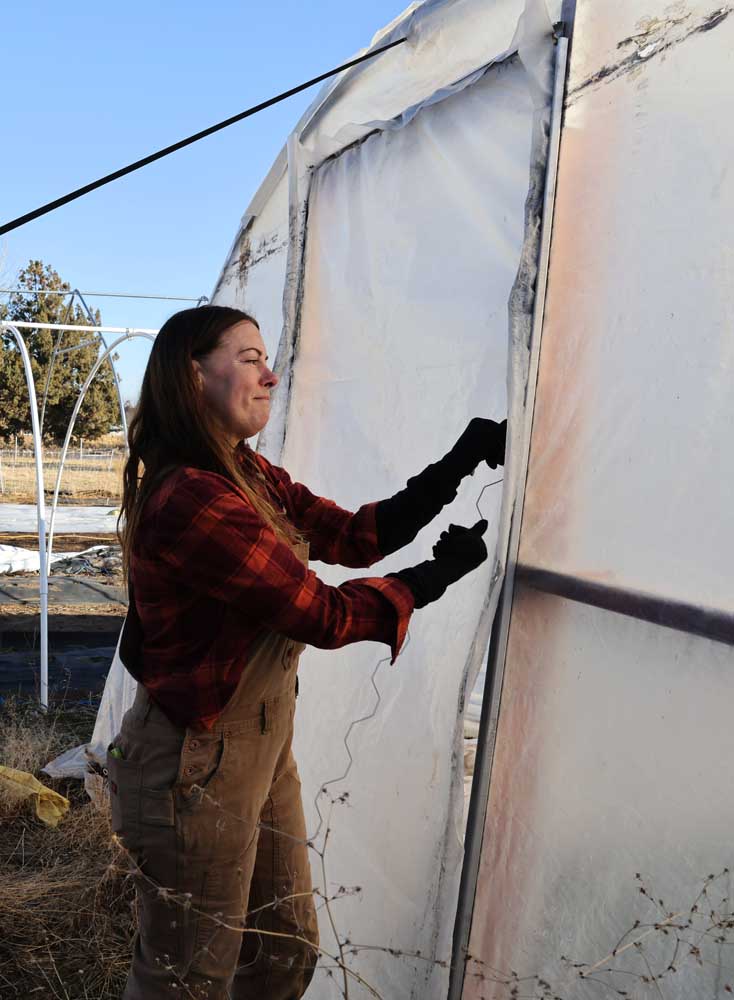Two Central Oregon farms join forces to supply community with fresh veggies
Published 5:45 am Thursday, December 5, 2024

- Lauren Rasmussen, co-owner of Fibonacci Farms, fastens the door on a greenhouse on her farm in Bend.
A short growing season and the high cost of land is at the root of two local farmers deciding to offer their customers a collaboratively grown box of veggies.
Boundless Farmstead in Alfalfa and Lauren Rasmussen of Fibonacci Farm in Bend, have partnered to provide a choose-your-own locally grown veggie box from their combined farms. The partnership allows the farmers to focus on things they grow that they do well with.
Each winter farmers seek members to buy a subscription to a weekly or bi-weekly veggie box known as the community supported agriculture program. They sell memberships now while they’re planning their crops that will be planted in the spring. For the coming growing season, the sale of community supported agriculture boxes go on sale Dec. 21. The two farms hope to sell 200 memberships. The funds sold through these memberships provide the working capital for the farmers to buy seed and equipment.
“Farming is a crazy profession,” said Greg Addington, Oregon Farm Bureau executive director. “You put all your resources into the ground and hope it grows. Agriculture is a high capital intense operation. The CSA approach is one way to get creative with the resources a farmer has.”
Rasmussen said she didn’t know of another pair of farmers in Oregon that are working together in selecting what to grow and sell.
“It’s honestly really progressive,” said Rasmussen. “It’s a new way for farmers to start working together. It’s not a competition. Our competition is the grocery store.”
Farmers typically make their money from wholesale orders, community supported agriculture and farmer’s markets. Boundless Farmstead and Fibonacci Farm, will be offering memberships for community supported agriculture program for weekly pickup that range in price from $700 to $1,050 and for biweekly pickup it ranges from $350 to $525.
“The CSA is a guaranteed sale,” Rasmussen said. “Farmer’s markets are temperamental. You don’t know who or how many shoppers will be there, particularly during smokey days. And that happens a lot. The CSA is a sustainable practice.”
In Central Oregon, farmers have fewer than 100 days to grow their crops before the irrigation tap is turned off and the weather turns cold, said Andrea Smith, Central Oregon Food and Farm Alliance agricultural support manager.
When the cost of land, workers, weather, pests and equipment is added, many farmers barely make ends meet. The community supported agriculture program helps offset that by securing revenue up front, Smith said.
“It’s important to have a robust and resilience food system in our community,” said Smith. “Food is fresher and it keeps the money here. We’ve lost knowing the farmer and where your food comes from.”
Customers get to select from a list of vegetables that will be harvested and can tailor their selections to the kinds and amount of a single vegetable they might need or want, Rasmussen said. The community supported agriculture box program is available June through October.
“There’s a lot of expenses that happen in the beginning of the year,” Rasmussen said. “We have to support our expenses and cash flow well before the farmer’s markets in May. We want to maintain sustainable farms. Central Oregon is a difficult place to grow and this way we can focus on the crops we’re really good at growing.”
For a list of other local community supported agriculture farmers, visit localharvest.org/bend-or/csa.
Madras gets its own brewery with opening of The Fortress






